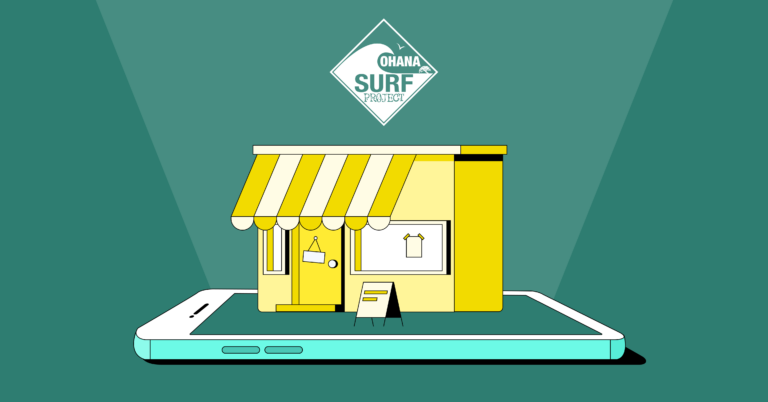Not many businesses emerge from the waves of Waikiki Beach. Surf champions, sure. Gorgeous sunsets, absolutely. Marriage proposals? Probably a few a day.
But for Susan Geraci and Sean Anderson, co-founders of the Ohana Surf Project, it was the perfect place to start a partnership that’s become a staple of the Honolulu community — and the beginning of Susan’s healing journey.
Susan was a young investment banker for Citibank in New York City. Training brought her to the World Trade Center complex on the morning of September 11, 2001.
“I was at 7 World Trade when one of the buildings fell that day. I happened to be there for one day of training — that was the only reason I was there. I was getting my breakfast at the cafeteria when the first plane hit.”
After a brief lockdown in the building, she fled for safety. Exiting 7 World Trade, she saw gut-wrenching attempts to flee that remain with her forever. Susan witnessed people try to escape the fire from the first tower by throwing themselves through windows. And in that moment, she had to keep going — to meet up with her partner. “I worked 10 blocks north, so I just started walking north. I was engaged to my [now] husband, who also worked at Citibank. So I was walking toward him.”
After reaching him, they joined other teammates at Fillipontes, a restaurant they used to host holiday parties. There, they watched the first tower fall. Quickly, the entire area became engulfed in smoke. Her soon-to-be husband urged them to start heading to their home in Brooklyn Heights.
All the bridges and tunnels closed to car traffic. With traffic under full gridlock, they walked home across the Manhattan Bridge along with hundreds of other people. As they got onto Manhattan Bridge, the second tower collapsed. “My fiance told us to not watch because we didn’t need one more tragic image emblazoned in our brains,” Susan recalls.
Susan and her fiance married three weeks after September 11th. Despite a happy wedding day and the joy her three daughters brought her, Susan found herself wrestling with PTSD and postpartum depression for many years.
That all changed on a family vacation to Oahu in 2014. She decided that was the summer she would learn to surf.
“I started surfing, and it was transformational,” she said. “The confidence I felt, the power felt being in the ocean, really changed my life. And right after that, I was like, ‘You know what? I think it’s time to get some therapy for this PTSD.’”
Surfing gave Susan the confidence she needed to start therapy. While in the water one day, she met her future business partner, former professional surfer Sean Anderson. Sean began to coach one of her daughters, and Susan saw his unique talent for guiding young surfers through the process.
Combining her business background and Sean’s skill and experience in the water, they formed the Ohana Surf Project in 2015. Their mission: make surfing accessible to anyone who wants to try it.
“I wanted to make sure as many people that had trauma or just needed a boost in their lives had that opportunity.”
Like Susan, Sean was not driven by profit but by a deeper purpose. He’s a dedicated father who takes his kids surfing anytime he can. But as he taught his kids skills, responsibilities, and appreciation of the water, he noticed not every Hawaiian child was afforded the same opportunity.
He was particularly struck by a family he used to see out on the waves — another father who went out into the ocean with his kids. One day, they stopped coming to the beach, and Sean discovered the father had died and there was no one left to mentor his children.
Despite its roots in Indigenous Hawaiian culture and traditions, surfing can be an exclusive sport. Because of a lack of resources and opportunities, native Hawaiians are often left out of surf events and competitions. Beaches can be hard to get to without transportation. Few surf coaches are able to accommodate students with physical or mental disabilities.
Sean and Susan saw that one way to enact change was through surf education — specifically through Sean’s teaching methods.
“He’s been able to take his teaching methodology and train all of our instructors, so they have a similar way of teaching and coaching, which has been great.”
Ohana Surf Project now offers private and group lessons, surf equipment, and transportation to and from lessons. They partner with various charitable organizations, including the Make-A-Wish® Foundation, the Wounded Warrior Project, the Mauli Ola Foundation, AccesSurf, and their own foundation. They also built a sustainable local business centered on nurturing the community of Waikiki surfers, greater Honolulu, and beyond.
“One of [our instructors] started with us when we began, and he was 14. He graduated high school and is now with us full-time,” Susan said.
“We wanted to make sure we could provide him with a job. We’re trying to help a lot of those kids get to a point where they can do something they love to do.”
Ohana’s differentiating factor in the crowded marketplace of surf lessons in Honolulu is based on two things: experience and accessibility. They hire only seasoned instructors who can handle students of all kinds. Many instructors speak other languages or specialize in water safety.
“People who are blind, who are deaf, who are disabled, who are super fearful of the ocean, who have any physical, emotional, or mental impairments — we can handle all of that. We didn’t want to be just another guy who has some beat-up boards on the top of his truck,” Susan said. “As we say, ‘It’s more than a surfing lesson.’”
Susan attributes their business growth since 2015 to networking, referrals, customer loyalty, and positive reviews.
Eventually, the biggest factor in growth was positive online reviews. “It didn’t take very long for us to get to the point where we were doubling our revenue and our customers every year, and that’s because [of] the reviews. Reviews matter so much, and our customers love their experience and tell other people.”
Retention is high — Susan estimates around 25 percent of Ohana’s revenue comes from repeat customers.
“They’ll come back year after year to Hawaii and [to] surf with us,” Susan says. And they refer their friends as well.
Now that Susan has made it past the darkest times, she has simple and thoughtful advice for anyone going through a similar journey. “Get the help,” she said. “Without help, you’re going to keep second-guessing yourself, and you need confidence.”
Beyond professional help, the support of friends and family is also instrumental — in your personal and professional life. “Everybody around you has to be onboard and able to support you in the transition as you get your company up and running. ‘Cause you could be working tons of hours, which was the case in the beginning for us.”
In hard moments, Susan draws from the lessons she’s learned from the ocean. “When you’re on the water, you can’t be anywhere but there. If you’re trying to actually surf, you can’t be thinking about what you’re going to be doing in four hours. You have to be right there. That was one of my biggest hurdles to overcome: getting out of my own head.”
That resilience and self-belief propel her forward. Susan says she hopes Ohana Surf Project will continue to grow in the years to come. She and Sean are working on a clothing line.

